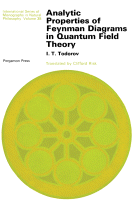Browse content
Table of contents
Actions for selected chapters
- Full text access
- Book chapterNo access
Introduction
Pages 1-12 - Book chapterAbstract only
CHAPTER 1 - The Quadratic Form of a Feynman Diagram
Pages 13-38 - Book chapterAbstract only
CHAPTER 2 - Majorization of Feynman Diagrams
Pages 39-71 - Book chapterAbstract only
CHAPTER 3 - Derivation of Spectral Representations and of Dispersion Relations
Pages 72-97 - Book chapterAbstract only
CHAPTER 4 - The Surface of Singularities of a Feynman Diagram. What else can we Learn from the Box Diagram?
Pages 98-139 - Book chapterNo access
References
Pages 140-149 - Book chapterNo access
Index
Pages 151-152
About the book
Description
Analytic Properties of Feynman Diagrams in Quantum Field Theory deals with quantum field theory, particularly in the study of the analytic properties of Feynman graphs. This book is an elementary presentation of a self-contained exposition of the majorization method used in the study of these graphs. The author has taken the intermediate position between Eden et al. who assumes the physics of the analytic properties of the S-matrix, containing physical ideas and test results without using the proper mathematical methods, and Hwa and Teplitz, whose works are more mathematically inclined with applications of algebraic topology and homology theory. The book starts with the definition of the quadratic form of a Feynman diagram, and then explains the majorization of Feynman diagrams. The book describes the derivation of spectral representations, the dispersion relations for the nucleon-nucleon scattering amplitude, and for the corresponding partial wave amplitude. The text then analyzes the surface of singularities of a Feynman diagram with notes explaining the Cutkosky rules of the Mandelstam representation for the box diagram. This text is ideal for mathematicians, physicists dealing with quantum theory and mechanics, students, and professors in advanced mathematics.
Analytic Properties of Feynman Diagrams in Quantum Field Theory deals with quantum field theory, particularly in the study of the analytic properties of Feynman graphs. This book is an elementary presentation of a self-contained exposition of the majorization method used in the study of these graphs. The author has taken the intermediate position between Eden et al. who assumes the physics of the analytic properties of the S-matrix, containing physical ideas and test results without using the proper mathematical methods, and Hwa and Teplitz, whose works are more mathematically inclined with applications of algebraic topology and homology theory. The book starts with the definition of the quadratic form of a Feynman diagram, and then explains the majorization of Feynman diagrams. The book describes the derivation of spectral representations, the dispersion relations for the nucleon-nucleon scattering amplitude, and for the corresponding partial wave amplitude. The text then analyzes the surface of singularities of a Feynman diagram with notes explaining the Cutkosky rules of the Mandelstam representation for the box diagram. This text is ideal for mathematicians, physicists dealing with quantum theory and mechanics, students, and professors in advanced mathematics.
Details
ISBN
978-0-08-016544-8
Language
English
Published
1971
Copyright
Copyright © 1971 Elsevier Ltd. All rights reserved.
Imprint
Pergamon
